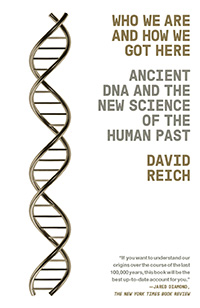 David Reich, Who We Are and How We Got Here: Ancient DNA and the New Science of the Human Past (New York: Pantheon, 2018), 335pp.
David Reich, Who We Are and How We Got Here: Ancient DNA and the New Science of the Human Past (New York: Pantheon, 2018), 335pp.
The history of scientific advances has in many ways been driven by game-changing technologies. One thinks of the invention of the microscope, how radiocarbon dating transformed archaeology, the discovery of penicillin, or, in our own day, gene-editing (CRISPR).
The Harvard geneticist David Reich has helped to pioneer another scientific revolution, the mapping of the human genome that began with the Human Genome Project in 1990 and was declared complete in 2003. But even as recently as 20 years ago, says Reich, we were still in the "dark ages of DNA," whereas today is a different story. In particular, Reich's book explains how our newfound ability to extract and analyze DNA from ancient fossils has rewritten our study of humanity's ancient past.
The big takeaway from his book is that any claim of racial purity (cf. Nazi Germany) is "absurd." Rather, humanity's ancient history has been defined by successive and massive waves of mixing, matching, and migrations among otherwise highly divergent population groups. The idea of a fixed or immutable race is scientifically untenable, as is the idea that race is merely a social construct and not biologically based. By analyzing the DNA from ancient fossils, Reich and his colleagues reconstruct our prehistory across both time and space. To take just one example, we now know that because of interbreeding long ago, today a non-African person's genome is about 1.5 to 2.1 percent Neanderthal in origin.
There are numerous practical, political, and ethical consequences of this DNA revolution, and in the third part of his book Reich addresses several of these: scientific and cultural stereotypes about the implications of genetics on biological nationalisms, genetic risk factors in health disparities among different ethnic groups (cf. sickle cell anemia among African Americans), physical differences like skin color or average height, caste systems based on geographic ancestry, cognitive and behavioral traits, personal ancestry testing like 23andMe, gender inequality, and the insistence that race is a social construct rather than scientifically based (a "false dichotomy"). Reich explains these controversies with clarity and compassion, and often shares his own story of being part of a particular population group (Ashkenazi Jews). But however controversial, he insists that we must never let old scientific orthodoxies or political correctness stand in the way of the power of "hard data" to overturn our assumptions about what it means to be human.
Dan Clendenin: dan@journeywithjesus.net


